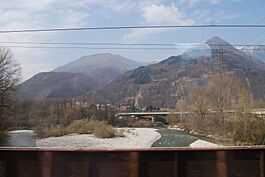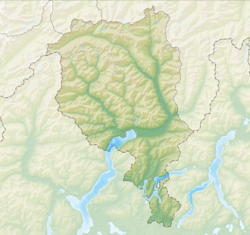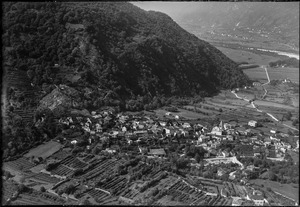Gorduno facts for kids
Quick facts for kids
Gorduno
|
||
|---|---|---|
 |
||
|
||
| Country | Switzerland | |
| Canton | Ticino | |
| District | Bellinzona | |
| Area | ||
| • Total | 9.2 km2 (3.6 sq mi) | |
| Elevation | 284 m (932 ft) | |
| Population
(December 2004)
|
||
| • Total | 682 | |
| • Density | 74.1/km2 (192.0/sq mi) | |
| Postal code |
6518
|
|
| Surrounded by | Arbedo-Castione, Bellinzona, Gnosca, Monte Carasso, Preonzo | |
Gorduno was once a small town, or municipality, located in the Bellinzona area of Ticino, a canton (like a state) in Switzerland.
On April 2, 2017, Gorduno joined with several other nearby towns. These included Camorino, Claro, Giubiasco, Gnosca, Gudo, Moleno, Monte Carasso, Pianezzo, Preonzo, Sant'Antonio, and Sementina. All these towns became part of the larger municipality of Bellinzona.
Contents
Gorduno's Past: A Look at Its History
The area where Gorduno is located has been settled since ancient times. However, we don't know much about the very first people who lived there.
The name Gorduno first appeared in records in 1182. It was mentioned during a disagreement between churches in Como and Milan. In 1202, this dispute was settled. The church in Como received a small church called SS Maurizio e Carpoforo. This church was located in the area of Gorduno, even though it was sometimes called the Castle of Gnosca. It was important because it was near the Ticino river.
Later, in the Late Middle Ages, Gorduno was a municipality within the Bellinzona region. By 1374, Gorduno and Gnosca were combined. They were put under the control of a Podestà, who was a church official from Milan. This meant the church in Gorduno followed the rules of the Diocese of Milan.
By the 1500s, the village church of SS Sebastiano e Rocco became the main church for the community.
Understanding Gorduno's Land and Geography
Gorduno covers an area of about 9.22 square kilometers (about 3.56 square miles). A large part of this land is covered by forests. About 72% of Gorduno is forested, which means it has many trees.
A smaller part, about 7%, is used for farming. This includes fields for growing crops and areas for animals to graze. About 6% of the land is built up with buildings and roads. A very small part, about 1.5%, includes rivers or lakes. The remaining land, about 11.3%, is unproductive. This means it's not used for farming or buildings, often because it's too rocky.
Gorduno's Official Symbol: The Coat of Arms
The official symbol, or coat of arms, for Gorduno is quite unique. It shows a red background with a white cross. On top of this, there is a black castle with battlements (the notched tops of castle walls). The castle has one tower on the left side. In the top left corner, there is a bunch of golden grapes.
Who Lives in Gorduno: Population and Languages
As of 2008, Gorduno had a population of about 735 people. About 13.6% of these residents were from other countries. Over ten years, from 1997 to 2007, the population grew by about 5.3%.
Most people in Gorduno speak Italian, which is about 93.9% of the population. German is the second most common language, spoken by about 2.7% of residents. A smaller number, about 1.4%, speak French.
In 2008, the population was almost evenly split between males and females. About 48.5% were male and 51.5% were female.
Here is a table showing how Gorduno's population has changed over many years:
| year | population |
|---|---|
| 1591 | 400 |
| 1801 | 262 |
| 1850 | 299 |
| 1900 | 426 |
| 1950 | 467 |
| 2000 | 621 |
Work and Economy in Gorduno
In 2005, Gorduno had a small number of businesses.
- The primary economic sector involves farming and natural resources. Gorduno had about 2 businesses in this area, employing 3 people.
- The secondary sector includes manufacturing and construction. There were 3 businesses in this sector, with 12 employees.
- The tertiary sector covers services, like shops, hotels, and offices. This was the largest sector, with 14 businesses employing 49 people.
In 2009, Gorduno had one hotel. Many people who lived in Gorduno traveled to other towns for work. About 74.3% of working residents used a private car to get to their jobs.
Faith and Religion in Gorduno
According to a 2000 survey, most people in Gorduno were Roman Catholic, making up about 90.7% of the population. A smaller group, about 2.1%, belonged to the Swiss Reformed Church. Some people belonged to other churches, and a few did not state their religion.
Learning in Gorduno: Education System
Switzerland has a strong education system. In Gorduno, about 77.4% of adults (aged 25-64) have completed high school or gone on to higher education.
As of 2009, there were 135 students in Gorduno.
- The education system in Ticino offers up to three years of optional kindergarten. In Gorduno, 23 children were in kindergarten.
- Primary school lasts for five years. In Gorduno, 35 students attended regular primary schools.
- After primary school, students go to lower secondary school. Some attend a two-year middle school, while others go into a four-year program to prepare for university. There were 34 students in the two-year middle school and 17 in the four-year advanced program.
- Upper secondary school prepares students for a trade or for university. Some students work while studying, and others study full-time. In Gorduno, 7 students were full-time vocational students, and 14 were part-time.
- A professional program, lasting three years, prepares students for jobs in fields like engineering or nursing. There were 4 students in this program.
In 2000, 71 students from Gorduno attended schools outside the municipality.
See also
 In Spanish: Gorduno para niños
In Spanish: Gorduno para niños





